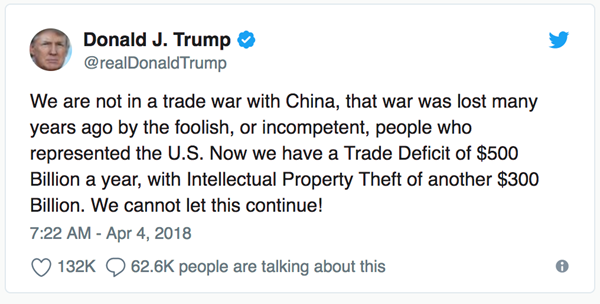Once again, the “mercantilist-in-chief” demonstrates his uninformed and “upside-down” thinking about trade and trade deficits.



We’ve heard for years now from Donald Trump about how China has perpetrated one of the “greatest thefts in the history of the world” when it comes to trade with the U.S. His latest Tweets today (above) claim that: a)”We are not in a trade war with China, that war was lost many years ago by the foolish, or incompetent, people who represented the U.S” and b) “When you’re already $500 Billion DOWN, you can’t lose!” Once again, the “mercantilist-in-chief” demonstrates his uninformed and “upside-down” thinking about trade and trade deficits.
As Milton Friedman explained back in the 1970s (italics added):
In the international trade area, the language is almost always about how we must export, and what’s really good is an industry that produces exports, and if we buy from abroad and import, that’s bad. But surely that’s upside-down. What we send abroad, we can’t eat, we can’t wear, we can’t use for our houses. The goods and services we send abroad, are goods and services not available to us. On the other hand, the goods and services we import, they provide us with TV sets we can watch, with automobiles we can drive, with all sorts of nice things for us to use.
The gain from foreign trade is what we import. What we export is a cost of getting those imports. And the proper objective for a nation as Adam Smith put it, is to arrange things so that we get as large a volume of imports as possible, for as small a volume of exports as possible.
This carries over to the terminology we use. When people talk about a favorable balance of trade, what is that term taken to mean? It’s taken to mean that we export more than we import. But from the point of our well-being, that’s an unfavorable balance. That means we’re sending out more goods and getting fewer in. Each of you in your private household would know better than that. You don’t regard it as a favorable balance when you have to send out more goods to get fewer coming in. It’s favorable when you can get more by sending out less.















No Comments